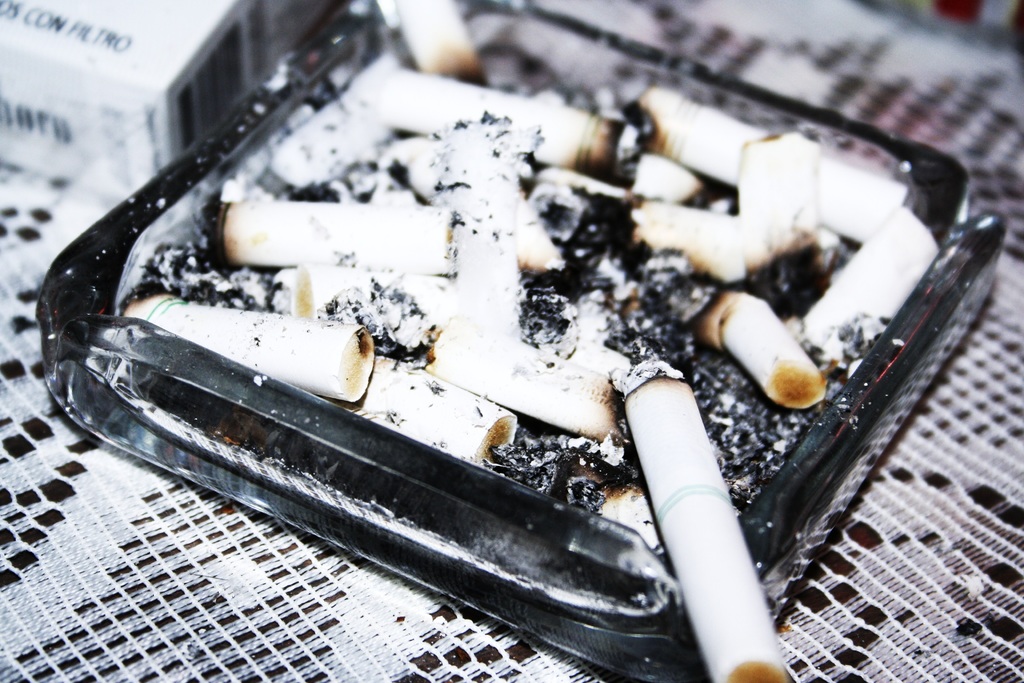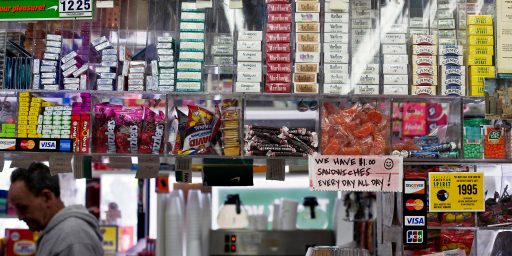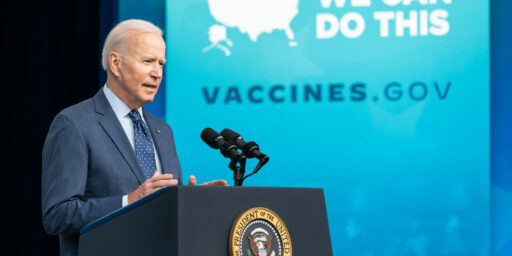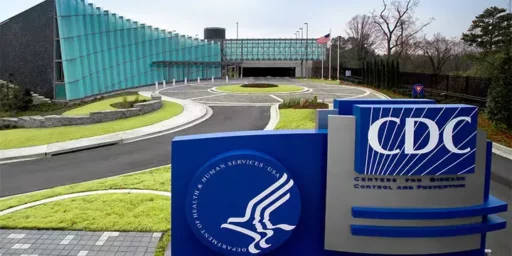Being Unvaccinated is Like Smoking
A new way to think about the problem.

Yale pathologist Benjamin Mazer argues that we’ve been using the wrong analogy to understand the end state of this pandemic: “COVID Won’t End Up Like the Flu. It Will Be Like Smoking.”
It’s suddenly become acceptable to say that COVID is—or will soon be—like the flu. Such analogies have long been the preserve of pandemic minimizers, but lately they’ve been creeping into more enlightened circles. Last month the dean of a medical school wrote an open letter to his students suggesting that for a vaccinated person, the risk of death from COVID-19 is “in the same realm, or even lower, as the average American’s risk from flu.” A few days later, David Leonhardt said as much to his millions of readers in the The New York Times‘ morning newsletter. And three prominent public-health experts have called for the government to recognize a “new normal” in which the SARS-CoV-2 coronavirus “is but one of several circulating respiratory viruses that include influenza, respiratory syncytial virus (RSV), and more.”
The end state of this pandemic may indeed be one where COVID comes to look something like the flu. Both diseases, after all, are caused by a dangerous respiratory virus that ebbs and flows in seasonal cycles. But I’d propose a different metaphor to help us think about our tenuous moment: The “new normal” will arrive when we acknowledge that COVID’s risks have become more in line with those of smoking cigarettes—and that many COVID deaths, like many smoking-related deaths, could be prevented with a single intervention.
The pandemic’s greatest source of danger has transformed from a pathogen into a behavior. Choosing not to get vaccinated against COVID is, right now, a modifiable health risk on par with smoking, which kills more than 400,000 people each year in the United States. Andrew Noymer, a public-health professor at UC Irvine, told me that if COVID continues to account for a few hundred thousand American deaths every year—“a realistic worst-case scenario,” he calls it—that would wipe out all of the life-expectancy gains we’ve accrued from the past two decades’ worth of smoking-prevention efforts.
Many of us have made a similar argument for months now. It’s what President Biden means when he calls this “a pandemic of the unvaccinated.” But Mazer’s analogy adds some useful perspective: smoking cigarettes and other behavioral choices kill comparable numbers of people as COVID.
The same arguments apply to tobacco: Smokers are 15 to 30 times more likely to develop lung cancer. Quitting the habit is akin to receiving a staggeringly powerful medicine, one that wipes out most of this excess risk. Yet smokers, like those who now refuse vaccines, often continue their dangerous lifestyle in the face of aggressive attempts to persuade them otherwise. Even in absolute numbers, America’s unvaccinated and current-smoker populations seem to match up rather well: Right now, the CDC pegs them at 13 percent and 14 percent of all U.S. adults, respectively, and both groups are likely to be poorer and less educated.
When P.J. O’Rourke passed this week of lung cancer, I deliberately chose a photograph of him smoking a cigar to illustrate the obituary post. That he had smoked for years almost certainly contributed to his early demise. He was neither poor nor uneducated but rather a highly intelligent person knowing he was taking a risk to indulge a pleasure.
Mazer details the decades-long effort we have put into changing people’s behavior with regard to tobacco use and the ongoing efforts to encourage COVID vaccination. Both have been wildly successful but, alas, not as successful as we would like.
We should neither expect that every stubbornly unvaccinated person will get jabbed before next winter nor despair that none of them will ever change their mind. Let’s accept instead that we may make headway slowly, and with considerable effort. This plausible outcome has important, if uncomfortable, policy implications. With a vaccination timeline that stretches over years, our patience for restrictions, especially on the already vaccinated, will be very limited. But there is middle ground. We haven’t banned tobacco outright—in fact, most states protect smokers from job discrimination—but we have embarked on a permanent, society-wide campaign of disincentivizing its use. Long-term actions for COVID might include charging the unvaccinated a premium on their health insurance, just as we do for smokers, or distributing frightening health warnings about the perils of remaining uninoculated. And once the political furor dies down, COVID shots will probably be added to the lists of required vaccinations for many more schools and workplaces.
He also acknowledges the obvious counterargument:
COVID is an infectious disease and tobacco use isn’t. (Tobacco is also addictive in a physiological sense, while vaccine resistance isn’t.) Many pandemic restrictions are based on the idea that any individual’s behavior may pose a direct health risk to everyone else. People who get vaccinated don’t just protect themselves from COVID; they reduce their risk of passing on the disease to those around them, at least for some limited period of time. Even during the Omicron wave, that protective effect has appeared significant: A person who has received a booster is 67 percent less likely to test positive for the virus than an unvaccinated person.
But the harms of tobacco can also be passed along from smokers to their peers. Secondhand-smoke inhalation causes more than 41,000 deaths annually in the U.S. (a higher mortality rate than some flu seasons’). Yet despite smoking’s well-known risks, many states don’t completely ban the practice in public venues; secondhand-smoke exposure in private homes and cars—affecting 25 percent of U.S. middle- and high-school children—remains largely unregulated. The general acceptance of these bleak outcomes, for smokers and nonsmokers alike, may hint at another aspect of where we’re headed with COVID. Tobacco is lethal enough that we are willing to restrict smokers’ personal freedoms—but only to a degree. As deadly as COVID is, some people won’t get vaccinated, no matter what, and both the vaccinated and unvaccinated will spread disease to others. A large number of excess deaths could end up being tolerated or even explicitly permitted. Noel Brewer, a public-health professor at the University of North Carolina, told me that anti-COVID actions, much like anti-smoking policies, will be limited not by their effectiveness but by the degree to which they are politically palatable.
Ultimately, Mazar argues, what makes the two different is how we feel about them. Because COVID is new and we focus on it on a daily basis, it seems like an emergency whereas the hundreds of thousands of early deaths from tobacco use are just a sad fact of life.






I find this an interesting comparison, because it’s occurred to me before that Covid misinformation is somewhat like tobacco denialism. That used to be a big thing among Republicans–they’d dispute the evidence that cigarettes cause lung cancer, or that they were even addictive. I remember Bob Dole in 1996 engaging in it; so did Mike Pence in 2000, during his first successful run for Congress. At some point, this practice just sort of faded, as Republicans latched onto new forms of science denialism (mostly regarding global warming).
Is there an equivalent to the Herman Cain Award for tobacco denialism? I do know Bob Dole had lung cancer when he died, but I must confess I hadn’t realized he was ever a smoker, and in any case he lived to such an advanced age it’s hard to think of him as an example of someone who paid the price for his beliefs. His 1996 rhetoric always sounded to me like he was simply pandering to his donors; he didn’t sound like he truly believed it.
My parents had a friend who died of lung cancer after years pooh-poohing the risks of smoking. Of course, the major difference with Covid denial is (as the article acknowledges) the element of addiction. Quitting smoking is hard, even if you know it’s killing you. In contrast, taking a vaccine or wearing a mask or practicing other safety protocols for Covid takes absolutely no willpower at all; the only thing stopping people from doing these things is the powerful grip misinformation has on them.
There is another thing they have in common. When public places started banning smoking there were always a few asshats who aggressively and obnoxiously smoked anyway because, by god, no one was going to tell them what to do.
The “infectious disease = secondhand smoke” bit isn’t enough to make the overall “COVID = smoking” analogy work, in my opinion. Secondhand smoke is a cumulative risk factor, whereas a single exposure is all it takes for an infectious disease. Also, tobacco smoke doesn’t mutate within the population of smokers, potentially becoming more deadly to non-smokers in the process. So no, I think this attempt to rationalize being unvaccinated as a personal choice assume the risk akin to smoking simply doesn’t work.
Smoking causes little health risk to other people * whereas not being vaxxed allows you to be an actual breeding ground for a RNA virus, and we know that RNA viruses have high mutation rates. My analogy for this virus would be HIV where about 35,000 new cases a year demonstrate that common sense hygiene might not be all that common.
*second hand smoke does cause some health risk to others: https://pubmed.ncbi.nlm.nih.gov/21112082/
@R. Dave: I don’t see Mazar trying to “rationalize” being unvaccinated so much as explaining how we should think about it. There’s only so much we can legally do to force people to behave rationally.
Smoking, alcohol etc. are addictive.
Is being unvaccinated addictive?
(I suppose you could call Fox News addictive, it does have pretty snappy production values).
I’m sorry but the writer in me does not like this analogy. It’s just too much of a stretch. In fact flu is the apt analogy: a highly infectious respiratory virus, mostly dangerous to the elderly, largely preventable by inoculation.
Side note: If PJ was smoking his cigar properly it almost certainly had nothing to do with his lung cancer. Correct cigar smoking has a negligible effect on death rates, and what small effect it has is on cancers of the mouth.
@charon:
I’ve never seen people take breaks from work to go outside and not take a vaccine.
@Kylopod:
Attempts at education, persuasion, reasoning etc. have been very ineffective, so maybe a bit like being addicted.
@Slugger: I commented on the Covid-HIV comparison a while back. My basic point was that its limited modes of transmission minimized its political impact and enabled conservatives to stigmatize those who got AIDS, primarily gay men.
I don’t think there really is any close analogy with any previous public health crisis. The 1918 flu had some parallels, though it was so long ago and in such a different political context.
I see there as being the following key components to the Covid crisis, not all of them unique, but all adding up to a basically unique and unprecedented situation: (1) A disease so infectious it kills numerous public figures, even very nearly taking the life of a sitting US president (2) It is global in scale (3) It crashes the health-care system and economy (4) It indirectly disrupts the lives of most people (5) It leads to a substantial move toward remote technology for work, school, shopping, and more (6) It inspires a denialist movement so powerful it provides an unusually obvious glimpse of people, including some famous people, paying the price for false beliefs.
@Michael Reynolds: P.J. O’Rourke was a cigarette smoker for a long time. And, as I noted in the thread about his passing, he had also had an earlier bout with a different type of cancer.
I’m not wild about this analogy either, although I do understand where it springs from.
@MarkedMan: Yep, that’s a good observation.
The only person in my near family who’s unvaccinated is also the only smoker. Not poor, but not well educated. It would be interesting to see a Ven diagram of the overlap of these groups.
I am frequently reminded of a scene in the old mini-series Gettysburg. The Union troops ask a Rebel prisoner what he’s fighting for. “Our rahts.” Your rats? No, our rahts, our rahts to live like we want. (Small fight with spellcheck over that.) Seatbelts, motorcycle helmets, smoking (@Kylopod: I’d forgotten there was a partisan aspect of that. I thought tobacco company bribery was bipartisan. But Boehner got a leg up passing it out.), and slavery. You fall back to “my rights’ when you’ve got nothing else. At least their right to smoke and not wear seatbelts only marginally impacts my rights, unlike your right to not be vaxxed.
@Kylopod: I recall that early in AIDS the medical community deliberately downplayed the gay sex aspect. They needed funding and wanted to minimize the predictable conservative reaction. Sometimes a little medical misinformation is OK.
@gVOR08:
You’d have to bring up more specifics; I don’t particularly remember any Democratic politician engaging in it, though I wouldn’t be surprised if there were at least a few. (For that matter, there have always been Dems out there who are pro-gun or anti-LGBT or other things we tend to associate more with Republicans. Culture-war Dems were more common in the ’90s than they are today–and yes, I class tobacco denialism as a culture-war thing.) Of course I’m well aware that glamorizing cigarette smoking was a big thing in supposedly liberal Hollywood, but that’s another story.
@Kylopod: Oh, there were a bunch of tobacco-state Democrats who opposed smoking bans.
https://www.nytimes.com/1994/04/02/us/tobacco-politics-falters-even-in-congress.html
@gVOR08:
A venn diagram of smokers, unvaxxed and education levels would be interesting. Though, anecdotally, it seems to me that any correlation between smokers and unvaxxed, the third leg on that stool isn’t education level, but openness to new information.
Among smokers that I know, there is an acknowledgement that smoking is a vile, health wrecking habit that they lack the will to control. This maybe caused by those individuals have internalized and accepted the arguments against smoking, while the unvaxxed are in denial.
@Kylopod:
An interesting bit of trivia on that: Back in the day Warner Brothers frowned on smoking in their movies. It wasn’t forbidden, but it was severely discouraged. When they started filming the Maltese Falcon, Bogart and his costars decided they were going to light up a cigarette every chance they could, to see how much they could get away with.
So the Film Noir cliché of lighting a cigarette, taking a long drag, and letting the smoke fill the scene started as a joke. 🙂
The argument being made here seems superior to the “pandemic is almost over, we can return to normal” case shopped around yesterday. There is a strong sense in which the only person you can protect is you, and the nation is going to have to come to some consensus about how we want to address the group that decides to remain disease vectors. Sadly, they will be more pernicious, intrusive, and problematical to control than second hand smoke was. Fun times ahead.
@Mu Yixiao: If they were willing to show cokehead humor during the Hays Code, tobacco was probably not much of a big leap for them.
It wasn’t until the 21st century that the MPAA even began factoring tobacco into their ratings.
An inapt analogy.
As a fairly recent ex-smoker, stopping smoking is not a binary A or B decision. It is not will. Your brain has become dependent and needs nicotine to feel as it is functioning normally.
Nicotine withdrawal is nasty. You feel hollow and as if your skin was made of fragile glass. The entire time your brain is screaming for just one hit. It is saying to you 87 bazillion times a day “I need. I want.” One little hit will make everything better.
It takes about two weeks to be rid of the physical addiction. It takes a lifetime I suspect to rid yourself of psychological addiction. I am on the phone, therefore I must have a cig. I’m in my car, ergo let’s fire a bad boy up. Some of those associative triggers are really insidious.
Breaking an addiction is not just a choice, it is also a process. A very hard process. Very prone to derailing if you give in once. Your brain is screaming in agony every second for just one more hit.
When I buy groceries and decide against going up to the side area where they sell the cigarettes and the spendy booze and don’t do it – that’s a win.
If smoking did not cause cancer, I would still be a smoker. I very much enjoy it on a deep level.
Knock wood.
@de stijl:
A very atypical anecdote:
My grandfather started smoking at 7 (yes, single digits; this was in the old country). At 77 (in the US) the doctor suggested he “cut back” on smoking.
GP: No. You want I should quit?
Dr: It would be good for you to quit, but let’s start with cutting back.
GP: No. You want I should quit? I quit.
He pulled the pack out of his pocket, set it on the doctor’s desk, and never had another cigarette.
====
Edit to add: In his last year, at a nursing home (when they still allowed residents to smoke at designated times), he turned to my Uncle Mike and asked
“Mikey? Do I smoke?”
“No, Papa. You don’t”.
“Oh. Okay.”
🙂
One interesting aspect of the “anti-vax==smoking” framing is that it points out the likelihood that at some point, insurers are probably going to start requiring proof of vaccination for health and life insurance purposes, and people who aren’t will either be straight up denied or charged higher premiums to cover the increased risk of long hospital stays and early death.
Will be interesting to see what happens when the “reducing corporate social responsibilities” block and the “extreme religious freedom block” are on opposing sides instead of uniting in a “Baptists and Bootleggers” style alliance to eliminate benefits.
That is an interesting comparison but I don’t think it quite works for the reasons that others cited.
And another big problem is that it assumes we know how Covid will play out in the future. It may be like other infectious diseases and be more like the flu, or we may remain in a cycle where mutations keep it infectious or deadly for some time to come.
I was reading this morning about the BA.2 Omicron variant which is reportedly both more infectious than the BA.1 variant, is better able to avoid immunity, is better at resisting therapeutics, and is potentially more likely to cause problems in the lungs.
That could cause another, worse wave – or it might not. There is nothing analogous about that to smoking.
@Michael Reynolds: O’Rourke was also a cigarette smoker, at least in his youth. But, yes, cigar smokers tend not to inhale the smoke in the same way—and not to go through 20 of them or more a day.
@James Joyner: Last that I recall a typical length cigar (~50/64 diameter and 6 0r 7 inches long) is considered to be the equivalent of 10 or 15 cigarettes. But that data comes from the anti-smoking people, so it may be exaggerated. Given that I usually spend about 45 minutes smoking a cigar that size, I suspect not.
And, in my wayward and misspent youth, I knew several people who smoked cigarettes, cigars, and a pipe depending on the time of day and circumstances. For an asthmatic, the number of people I knew and hung with who smoked regularly was pretty amazing.
@James Joyner: @Michael Reynolds:
I could never get into cigars.
I could smoke them correctly for 15 or 20 minutes and then my brain would wander and I would fully inhale as if were a cigarette. Not every time but 3 times out 5 range.
After you inhale cigar smoke everything tastes like cigar for a day or two. Take sip of Coke – tastes like cigar. Have a burger – tastes like cigar.
Eventually, I figured out to decline the offer and don’t even try anymore.
@de stijl:
I smoked a cigar once, after which I spent the next several hours repeatedly vomitting, because apparently I have an allergy to nicotine.
I read that differently than most of you.
With the caveat that all analogies will fail if you look at them hard enough, I think the point of the analogy is less about the addictive quality of smoking and more about the pressures, direct and indirect, (e.g. societal, economic, etc) that can be used to incentivize behavior. That behavior won’t change overnight, just like smoking, but given enough time and pressure, we will start seeing those changes.
Another way of looking at it is that smoking was a harder behavior to challenge and reduce given its place in society and its addictive qualities, but our society was somewhat successful in reducing the incidence of smoking (I just looked it up. Around 42% of the US population smoked in 1965, and it’s down to 13.7% now). Getting people to accept vaccines (or at least the covid vaccine) should be a lot easier.
@James Joyner:
Sort of depend on what type of cigar you smoke. My father was a cigar smoker, not fat stogies from Cuba or a replica, but the cheapies that were sold in 6 or 8 packs. He’d go through a pack of these a day and each cigar probably had more tobacco than 5 or 6 cigarettes. If he had lived long enough, he died at 53, I’m sure cancer would have gotten him in his 60’s. In the several years before he died of cardiac disease, he start each morning sitting on the side of the bed coughing away and producing a couple of table spoons of phlegm. After he died, his doctor conceded that dad’s lungs were a mess. I’ll counter @Michael Reynolds:, there is no way to smoke cigars that doesn’t cause damage, it is only the frequency and smoke consumed that can make some difference.
@Mike in Arlington:
Agreed. It’s an imperfect analogy but the rates of those resisting public health messaging and the annual death rates are shockingly similar.
@de stijl:
Fairly recently I gave cigars a try and this was my experience.
And, really, I didn’t really get that much out of the actual smoking.
@Sleeping Dog: Going through a pack of Muriels or
Roi-Tans a day is a considerable piece of smoking though. My grandfather smoked one or two cigars of the same type in a day.
@just nutha:
My point exactly. He always hid behind, ‘you don’t inhale cigars’ trope. It was BS, and I believe he knew it. He certainly did all he could to keep my brother and I from smoking, and except for Mary Jane, he was successful.
@Steven L. Taylor: I think cigar smoking is definitely an acquired taste. So are whiskies, IPAs, kumquats and persimmons, and lots of other things. I find sitting in the park smoking a cigar and sipping an espresso pretty relaxing. But it’s only in recent times that I’ve really started to “get that much” out of the smoking and I’ve been smoking at least occasionally for quite a few years.
A useful analogy in that it points out that it is people’s behavior that is now the major risk. Your risk of dying largely goes away of you get vaccinated, a behavior. Your risks of smoking largely go away if you stop smoking (soon enough).
Steve
I smoked all three (cigarettes, cigars, pipe) at different times in a 40-year-off-and-on smoking career. My life has been so much better since I quit, although I still get the occasional urge. When I finally resolved to quit, I remarked to friends, “I could make a fortune if I could produce a cigarette where the first one you smoke in the morning tastes as bad as the last one at night.”
@de stijl: @James Joyner:
If I inhale I cough and gag for twenty minutes. I can barely handle inhaling vapes.
My first cigarette was in the dry moat of a Vauban fort in Fouras, France. No explanation needed, I just like being able to say that.
@Steven L. Taylor:
I used to like to roll past Chapel Hill college kids in my black, Mercedes S-class while smoking an obnoxiously fat stogie. I’m not above a bit of self-parody.